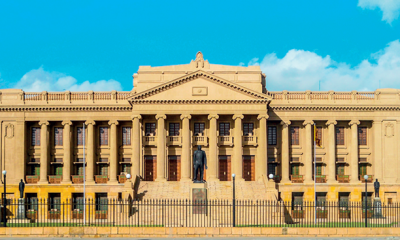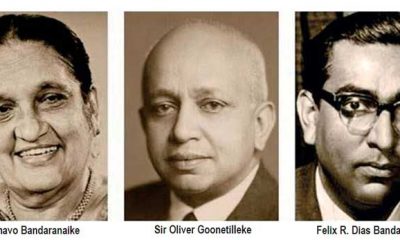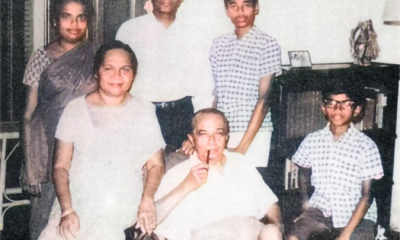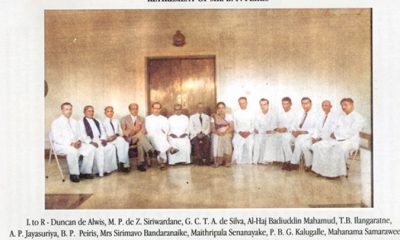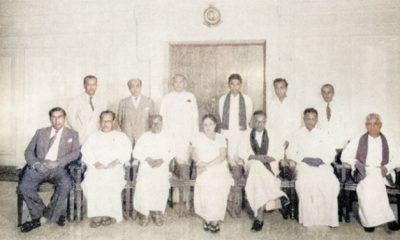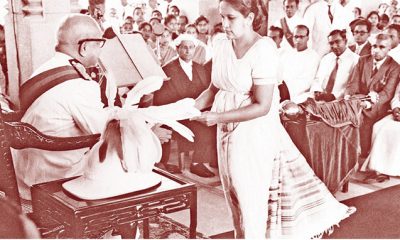Features
Queen’s Speech leak and a threat of resignation followed by retirement
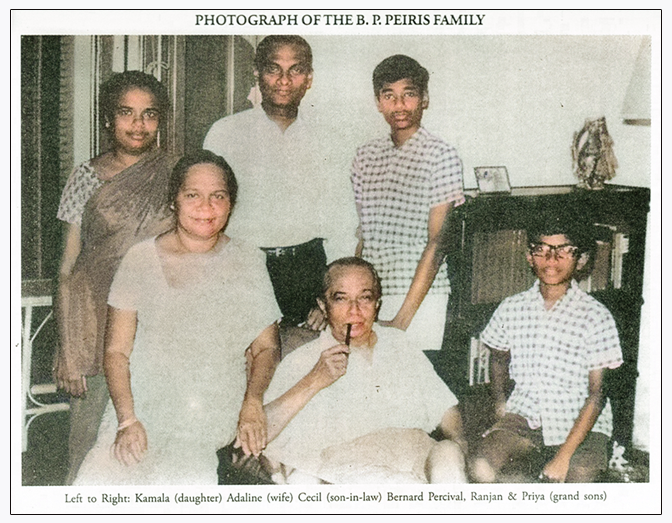
(Excerpted from Memoirs of a Cabinet Secretary by BP Peiris)
With prorogation, began my holiday task – the preparation of the Queen’s Speech. On this occasion, I had all the time I needed for thinking and I decided upon an entirely new technique in drafting. In order to prevent Ministers tinkering with my draft and, for prestige reasons of their own, insert a paragraph here and a paragraph there, I decided to include in the Speech everything that could possibly be included and ask the Ministers to delete what they did not want. My scheme worked.
When a Minister said “I’d like to say something about the Panchen Lama and the headhunters of Borneo”, I would say “That’s there at pages six and seven”. But my draft, which extended to twelve pages, was far too long and had to be drastically pruned. This was done at four separate meetings. At each meeting I took back all the copies I had circulated, put one in my office file for purposes of record and the rest in the office incinerator.
At the fourth meeting, the final draft had been reduced to a sizable four pages, and on the next day, nearly 20 points from the Speech leaked to the Press, an unprecedented thing. Naturally, the Prime Minister was angry. That feeling of suspicion about the other fellow still prevailed among the Ministers. In this atmosphere, the Prime Minister asked at the next meeting “How could this have happened? Mr Peiris gave you the copies and took them all back every time. This can’t be a leak through the Ministers. It can only be a leak from the Cabinet Office”.
Trembling with anger, I retorted, “Madam, your remark shows that you have serious doubts about my integrity, in which case I am prepared to leave this office and the public service immediately”. She said she was not referring to me. The leak could have taken place through one of my clerks. I replied that this work had always been entrusted to my most senior clerks, that I was not used to passing blame to my subordinates, and that I took the entire responsibility upon myself.
I added “Madam, now that you have raised this matter, I wish to say, with sorrow, something that has been boiling within me for the last few years. This is not the first leak to the Press. Our decisions have been appearing regularly in the Press after our meetings and three top executives in the Press have given me the names of five Ministers, now present in this room, who are the sources of their information. Please don’t embarrass me by asking me for their names”.
I expected a sort of “How dare you?” from one of the Ministers. No one spoke and Madam proceeded with the Agenda. We were four brothers, three of whom had taken to Government service and one to planting. During my last years as a public servant, the three of us who were drawing the Queen’s shilling were the Heads of our respective Departments. I, a lawyer, .was Secretary to the Cabinet; brother S. W., an engineer, was General Manager of the Government Electrical Undertakings; and brother G. S., the youngest, was Director-General of External Affairs. This, I believe, is unique in the history of our public service.
The Cabinet at this time decided that Sinhala as the Official language should be made “fully effective” in the administration from January 1, 1964. Accounts were to be kept in the official language which I did not understand. I was required, as Head of Department, to certify the correctness of my Appropriation Account which went to the Auditor-General and the Public Accounts Committee of the House of Representatives. After 27 years of honourable public service, twice honoured by the Sovereign, once only surcharged by audit in a sum of six cents for overpaying my dear friend Harrry Wendt on a travelling claim for going from the Legal Draftsman’s Chambers to the State Council, I was not prepared to sign an important financial document of the Government like the Appropriation Account, in a language I did not understand.
I addressed the following letter to the Governor-General after apprising the Prime Minister of my intention. She tried her best to persuade me to change my mind, but understood when I told her that my conscience would be troubling me when I knew that I was continuing to bat after I had been out according to the M. C. C. Rules:
To His Excellency the Governor-General
Your Excellency,
My term of office as Secretary to the Cabinet was extended by Your Excellency on the recommendation of the Hon. the Prime Minister under section 50 of the Ceylon (Constitution) Order in Council until March 29,1964, when I shall reach the age of fifty-six years. In the meantime, the Cabinet has decided that Sinhala should be made fully effective in the administration by January 1, 1964.
I am not proficient in Sinhala and I will therefore be unable, as the Chief Accounting Officer of this Department, to read my Votes Ledger, Petty Cash Ledger, Vouchers and other financial documents which will be in Sinhala. I will therefore be unable to give my certificate to the Auditor-General that my Appropriation Account is in order.
I have also undertaken to give Your Excellency at least three months notice before my retirement.
I have the honour, therefore, to request Your Excellency to be so good as to allow me to retire from my office on December 31,1963, and to allow me leave preparatory to retirement which my office informs me is 37 days, and to relieve me of my duties as Secretary to the Cabinet on November 16, 1963.
As the appointment of my successor is in Your Excellency’s hands I have no doubt that the Hon. Prime Minister will make a recommendation in due course.
I am,
Your Excellency’s obedient servant,
B. P. Peiris.
Secretary to the Cabinet.
When the news of my impending retirement got out, the following appeared in the “Daily News” under the nom de plume ‘w’:
“In a Parliamentary democracy, where party politics in comparatively new and tends to colour the judgment of officials close to the seat of political power, B. P. Peiris, as Secretary to the Cabinet, has been unique. He had no political affinities whatsoever.
“D.S. Senanayake, Dudley Senanayake, Sir John Kotelawala, S.W.R.D. Bandaranaike, W. Dahanayake, again Dudley Senanayake, and finally, Mrs Sirimavo Bandaranaike – they were all, to him, Prime Ministers of Ceylon whose interests he served as long as they were, or are, Prime Minister. He had nothing to do with their politics but had everything to do with the art of Cabinet Government which they were called upon to practise.
“As Assistant Secretary first, and later as Secretary to the Cabinet, he was loyal to each of them, while each of them functioned as Heads of Government.
“No man had a better opportunity to compare and contrast the strength and weaknesses of the Prime Ministers of Ceylon than B. P. Peiris. But he never compared and contrasted because he was always conscious of his obligations as the chief executive of the citadel of Government. He was no uneducated menial, thrown up by patronage, to high office. He came to serve in the Cabinet room from the Legal Draftsman’s Department.
“A graduate of the University of London and a Barrister-at-Law of Lincoln’s Inn, and with experience in legal draftsmanship he was a worthy successor to T. D. Perera and A. G. Ranasinha who were Secretaries to the Cabinet before him. And with many years’ experience of Cabinet Government, he came to be regarded as a trusted adviser at Cabinet meetings. During his long career, B. P. Peiris has maintained the high standards of honourable conduct, never using his position to secure undue advantage for himself or for any others connected to him by ties of relationship or friendship. In fact, it was on a matter of principle that he has sent in his retirement papers.
“Under the new ‘Sinhala Only’ policy, as head of the Cabinet Office, he will have, he argued within himself, to sign the annual estimates of expenditure prepared in Sinhala. Could he, not knowing Sinhala, adecuately, sip a document which he did not understand but for which he would be responsible? Intellectual honesty, therefore, demanded that he should go away.
“That is one inside story worthy of record during a period of our Island history where intellectual honesty is as difficult to locate as a nail in a paddy barn.
“Choosing to live a secluded life owing to the office he held, B. P. Peiris had few friends, save a few cronies who were, like him, interested in music. To him, the joy of living always centred round his piano, and he also had the good fortune to have a daughter and a son-in-law and a tiny tot of a grandson who played other instruments while he presided at the piano.
Peiris was indeed a ‘character’ in the public service. Long before politicians for their own ends made a fetish of the common man, Peiris, the Barrister-at-Law of Lincoln’s Inn, the man who spoke and read
naughty French novels and loved good music, was a dearly beloved comrade of the arachchies and the peons who worked for him. Indeed, those who will miss him in office will include, not only Cabinet Ministers of the land, but Mr Common Man of the Cabinet Office.”
I was to go on leave on November 14, 1963, and retire on December 31 of the same year. Before my retirement, I mentioned to my friend and colleague at the Bar, Sam P. C. Fernando, Minister of Justice, that I had been, for 17 years a Justice of the Peace Ex Officio for the judicial district of Colombo, that the appointment would lapse on my retirement and that it would be an honour to me if I could continue to hold the office in my individual capacity. People in the area had got to know me and made use of my services. A few days later, I received my letter of appointment as a Justice of the Peace for all the judicial districts of the Island.
November 13, 1963, was my last working day. The Cabinet sat for a group photograph with me and entertained me at lunch in the Senate. The Prime Minister in a farewell speech spoke of my loyalty, honesty and integrity and wished me happiness in my retirement.
In spite of the high cost of living, my office staff entertained me at a farewell lunch at the Grand Oriental Hotel.
And so ended my career as Secretary to the Cabinet.
(Concluded)
Features
The heart-friendly health minister

by Dr Gotabhya Ranasinghe
Senior Consultant Cardiologist
National Hospital Sri Lanka
When we sought a meeting with Hon Dr. Ramesh Pathirana, Minister of Health, he graciously cleared his busy schedule to accommodate us. Renowned for his attentive listening and deep understanding, Minister Pathirana is dedicated to advancing the health sector. His openness and transparency exemplify the qualities of an exemplary politician and minister.
Dr. Palitha Mahipala, the current Health Secretary, demonstrates both commendable enthusiasm and unwavering support. This combination of attributes makes him a highly compatible colleague for the esteemed Minister of Health.
Our discussion centered on a project that has been in the works for the past 30 years, one that no other minister had managed to advance.
Minister Pathirana, however, recognized the project’s significance and its potential to revolutionize care for heart patients.
The project involves the construction of a state-of-the-art facility at the premises of the National Hospital Colombo. The project’s location within the premises of the National Hospital underscores its importance and relevance to the healthcare infrastructure of the nation.
This facility will include a cardiology building and a tertiary care center, equipped with the latest technology to handle and treat all types of heart-related conditions and surgeries.
Securing funding was a major milestone for this initiative. Minister Pathirana successfully obtained approval for a $40 billion loan from the Asian Development Bank. With the funding in place, the foundation stone is scheduled to be laid in September this year, and construction will begin in January 2025.
This project guarantees a consistent and uninterrupted supply of stents and related medications for heart patients. As a result, patients will have timely access to essential medical supplies during their treatment and recovery. By securing these critical resources, the project aims to enhance patient outcomes, minimize treatment delays, and maintain the highest standards of cardiac care.
Upon its fruition, this monumental building will serve as a beacon of hope and healing, symbolizing the unwavering dedication to improving patient outcomes and fostering a healthier society.We anticipate a future marked by significant progress and positive outcomes in Sri Lanka’s cardiovascular treatment landscape within the foreseeable timeframe.
Features
A LOVING TRIBUTE TO JESUIT FR. ALOYSIUS PIERIS ON HIS 90th BIRTHDAY

by Fr. Emmanuel Fernando, OMI
Jesuit Fr. Aloysius Pieris (affectionately called Fr. Aloy) celebrated his 90th birthday on April 9, 2024 and I, as the editor of our Oblate Journal, THE MISSIONARY OBLATE had gone to press by that time. Immediately I decided to publish an article, appreciating the untiring selfless services he continues to offer for inter-Faith dialogue, the renewal of the Catholic Church, his concern for the poor and the suffering Sri Lankan masses and to me, the present writer.
It was in 1988, when I was appointed Director of the Oblate Scholastics at Ampitiya by the then Oblate Provincial Fr. Anselm Silva, that I came to know Fr. Aloy more closely. Knowing well his expertise in matters spiritual, theological, Indological and pastoral, and with the collaborative spirit of my companion-formators, our Oblate Scholastics were sent to Tulana, the Research and Encounter Centre, Kelaniya, of which he is the Founder-Director, for ‘exposure-programmes’ on matters spiritual, biblical, theological and pastoral. Some of these dimensions according to my view and that of my companion-formators, were not available at the National Seminary, Ampitiya.
Ever since that time, our Oblate formators/ accompaniers at the Oblate Scholasticate, Ampitiya , have continued to send our Oblate Scholastics to Tulana Centre for deepening their insights and convictions regarding matters needed to serve the people in today’s context. Fr. Aloy also had tried very enthusiastically with the Oblate team headed by Frs. Oswald Firth and Clement Waidyasekara to begin a Theologate, directed by the Religious Congregations in Sri Lanka, for the contextual formation/ accompaniment of their members. It should very well be a desired goal of the Leaders / Provincials of the Religious Congregations.
Besides being a formator/accompanier at the Oblate Scholasticate, I was entrusted also with the task of editing and publishing our Oblate journal, ‘The Missionary Oblate’. To maintain the quality of the journal I continue to depend on Fr. Aloy for his thought-provoking and stimulating articles on Biblical Spirituality, Biblical Theology and Ecclesiology. I am very grateful to him for his generous assistance. Of late, his writings on renewal of the Church, initiated by Pope St. John XX111 and continued by Pope Francis through the Synodal path, published in our Oblate journal, enable our readers to focus their attention also on the needed renewal in the Catholic Church in Sri Lanka. Fr. Aloy appreciated very much the Synodal path adopted by the Jesuit Pope Francis for the renewal of the Church, rooted very much on prayerful discernment. In my Religious and presbyteral life, Fr.Aloy continues to be my spiritual animator / guide and ongoing formator / acccompanier.
Fr. Aloysius Pieris, BA Hons (Lond), LPh (SHC, India), STL (PFT, Naples), PhD (SLU/VC), ThD (Tilburg), D.Ltt (KU), has been one of the eminent Asian theologians well recognized internationally and one who has lectured and held visiting chairs in many universities both in the West and in the East. Many members of Religious Congregations from Asian countries have benefited from his lectures and guidance in the East Asian Pastoral Institute (EAPI) in Manila, Philippines. He had been a Theologian consulted by the Federation of Asian Bishops’ Conferences for many years. During his professorship at the Gregorian University in Rome, he was called to be a member of a special group of advisers on other religions consulted by Pope Paul VI.
Fr. Aloy is the author of more than 30 books and well over 500 Research Papers. Some of his books and articles have been translated and published in several countries. Among those books, one can find the following: 1) The Genesis of an Asian Theology of Liberation (An Autobiographical Excursus on the Art of Theologising in Asia, 2) An Asian Theology of Liberation, 3) Providential Timeliness of Vatican 11 (a long-overdue halt to a scandalous millennium, 4) Give Vatican 11 a chance, 5) Leadership in the Church, 6) Relishing our faith in working for justice (Themes for study and discussion), 7) A Message meant mainly, not exclusively for Jesuits (Background information necessary for helping Francis renew the Church), 8) Lent in Lanka (Reflections and Resolutions, 9) Love meets wisdom (A Christian Experience of Buddhism, 10) Fire and Water 11) God’s Reign for God’s poor, 12) Our Unhiddden Agenda (How we Jesuits work, pray and form our men). He is also the Editor of two journals, Vagdevi, Journal of Religious Reflection and Dialogue, New Series.
Fr. Aloy has a BA in Pali and Sanskrit from the University of London and a Ph.D in Buddhist Philosophy from the University of Sri Lankan, Vidyodaya Campus. On Nov. 23, 2019, he was awarded the prestigious honorary Doctorate of Literature (D.Litt) by the Chancellor of the University of Kelaniya, the Most Venerable Welamitiyawe Dharmakirthi Sri Kusala Dhamma Thera.
Fr. Aloy continues to be a promoter of Gospel values and virtues. Justice as a constitutive dimension of love and social concern for the downtrodden masses are very much noted in his life and work. He had very much appreciated the commitment of the late Fr. Joseph (Joe) Fernando, the National Director of the Social and Economic Centre (SEDEC) for the poor.
In Sri Lanka, a few religious Congregations – the Good Shepherd Sisters, the Christian Brothers, the Marist Brothers and the Oblates – have invited him to animate their members especially during their Provincial Congresses, Chapters and International Conferences. The mainline Christian Churches also have sought his advice and followed his seminars. I, for one, regret very much, that the Sri Lankan authorities of the Catholic Church –today’s Hierarchy—- have not sought Fr.
Aloy’s expertise for the renewal of the Catholic Church in Sri Lanka and thus have not benefited from the immense store of wisdom and insight that he can offer to our local Church while the Sri Lankan bishops who governed the Catholic church in the immediate aftermath of the Second Vatican Council (Edmund Fernando OMI, Anthony de Saram, Leo Nanayakkara OSB, Frank Marcus Fernando, Paul Perera,) visited him and consulted him on many matters. Among the Tamil Bishops, Bishop Rayappu Joseph was keeping close contact with him and Bishop J. Deogupillai hosted him and his team visiting him after the horrible Black July massacre of Tamils.
Features
A fairy tale, success or debacle

Sri Lanka-Singapore Free Trade Agreement
By Gomi Senadhira
senadhiragomi@gmail.com
“You might tell fairy tales, but the progress of a country cannot be achieved through such narratives. A country cannot be developed by making false promises. The country moved backward because of the electoral promises made by political parties throughout time. We have witnessed that the ultimate result of this is the country becoming bankrupt. Unfortunately, many segments of the population have not come to realize this yet.” – President Ranil Wickremesinghe, 2024 Budget speech
Any Sri Lankan would agree with the above words of President Wickremesinghe on the false promises our politicians and officials make and the fairy tales they narrate which bankrupted this country. So, to understand this, let’s look at one such fairy tale with lots of false promises; Ranil Wickremesinghe’s greatest achievement in the area of international trade and investment promotion during the Yahapalana period, Sri Lanka-Singapore Free Trade Agreement (SLSFTA).
It is appropriate and timely to do it now as Finance Minister Wickremesinghe has just presented to parliament a bill on the National Policy on Economic Transformation which includes the establishment of an Office for International Trade and the Sri Lanka Institute of Economics and International Trade.
Was SLSFTA a “Cleverly negotiated Free Trade Agreement” as stated by the (former) Minister of Development Strategies and International Trade Malik Samarawickrama during the Parliamentary Debate on the SLSFTA in July 2018, or a colossal blunder covered up with lies, false promises, and fairy tales? After SLSFTA was signed there were a number of fairy tales published on this agreement by the Ministry of Development Strategies and International, Institute of Policy Studies, and others.
However, for this article, I would like to limit my comments to the speech by Minister Samarawickrama during the Parliamentary Debate, and the two most important areas in the agreement which were covered up with lies, fairy tales, and false promises, namely: revenue loss for Sri Lanka and Investment from Singapore. On the other important area, “Waste products dumping” I do not want to comment here as I have written extensively on the issue.
1. The revenue loss
During the Parliamentary Debate in July 2018, Minister Samarawickrama stated “…. let me reiterate that this FTA with Singapore has been very cleverly negotiated by us…. The liberalisation programme under this FTA has been carefully designed to have the least impact on domestic industry and revenue collection. We have included all revenue sensitive items in the negative list of items which will not be subject to removal of tariff. Therefore, 97.8% revenue from Customs duty is protected. Our tariff liberalisation will take place over a period of 12-15 years! In fact, the revenue earned through tariffs on goods imported from Singapore last year was Rs. 35 billion.
The revenue loss for over the next 15 years due to the FTA is only Rs. 733 million– which when annualised, on average, is just Rs. 51 million. That is just 0.14% per year! So anyone who claims the Singapore FTA causes revenue loss to the Government cannot do basic arithmetic! Mr. Speaker, in conclusion, I call on my fellow members of this House – don’t mislead the public with baseless criticism that is not grounded in facts. Don’t look at petty politics and use these issues for your own political survival.”
I was surprised to read the minister’s speech because an article published in January 2018 in “The Straits Times“, based on information released by the Singaporean Negotiators stated, “…. With the FTA, tariff savings for Singapore exports are estimated to hit $10 million annually“.
As the annual tariff savings (that is the revenue loss for Sri Lanka) calculated by the Singaporean Negotiators, Singaporean $ 10 million (Sri Lankan rupees 1,200 million in 2018) was way above the rupees’ 733 million revenue loss for 15 years estimated by the Sri Lankan negotiators, it was clear to any observer that one of the parties to the agreement had not done the basic arithmetic!
Six years later, according to a report published by “The Morning” newspaper, speaking at the Committee on Public Finance (COPF) on 7th May 2024, Mr Samarawickrama’s chief trade negotiator K.J. Weerasinghehad had admitted “…. that forecasted revenue loss for the Government of Sri Lanka through the Singapore FTA is Rs. 450 million in 2023 and Rs. 1.3 billion in 2024.”
If these numbers are correct, as tariff liberalisation under the SLSFTA has just started, we will pass Rs 2 billion very soon. Then, the question is how Sri Lanka’s trade negotiators made such a colossal blunder. Didn’t they do their basic arithmetic? If they didn’t know how to do basic arithmetic they should have at least done their basic readings. For example, the headline of the article published in The Straits Times in January 2018 was “Singapore, Sri Lanka sign FTA, annual savings of $10m expected”.
Anyway, as Sri Lanka’s chief negotiator reiterated at the COPF meeting that “…. since 99% of the tariffs in Singapore have zero rates of duty, Sri Lanka has agreed on 80% tariff liberalisation over a period of 15 years while expecting Singapore investments to address the imbalance in trade,” let’s turn towards investment.
Investment from Singapore
In July 2018, speaking during the Parliamentary Debate on the FTA this is what Minister Malik Samarawickrama stated on investment from Singapore, “Already, thanks to this FTA, in just the past two-and-a-half months since the agreement came into effect we have received a proposal from Singapore for investment amounting to $ 14.8 billion in an oil refinery for export of petroleum products. In addition, we have proposals for a steel manufacturing plant for exports ($ 1 billion investment), flour milling plant ($ 50 million), sugar refinery ($ 200 million). This adds up to more than $ 16.05 billion in the pipeline on these projects alone.
And all of these projects will create thousands of more jobs for our people. In principle approval has already been granted by the BOI and the investors are awaiting the release of land the environmental approvals to commence the project.
I request the Opposition and those with vested interests to change their narrow-minded thinking and join us to develop our country. We must always look at what is best for the whole community, not just the few who may oppose. We owe it to our people to courageously take decisions that will change their lives for the better.”
According to the media report I quoted earlier, speaking at the Committee on Public Finance (COPF) Chief Negotiator Weerasinghe has admitted that Sri Lanka was not happy with overall Singapore investments that have come in the past few years in return for the trade liberalisation under the Singapore-Sri Lanka Free Trade Agreement. He has added that between 2021 and 2023 the total investment from Singapore had been around $162 million!
What happened to those projects worth $16 billion negotiated, thanks to the SLSFTA, in just the two-and-a-half months after the agreement came into effect and approved by the BOI? I do not know about the steel manufacturing plant for exports ($ 1 billion investment), flour milling plant ($ 50 million) and sugar refinery ($ 200 million).
However, story of the multibillion-dollar investment in the Petroleum Refinery unfolded in a manner that would qualify it as the best fairy tale with false promises presented by our politicians and the officials, prior to 2019 elections.
Though many Sri Lankans got to know, through the media which repeatedly highlighted a plethora of issues surrounding the project and the questionable credentials of the Singaporean investor, the construction work on the Mirrijiwela Oil Refinery along with the cement factory began on the24th of March 2019 with a bang and Minister Ranil Wickremesinghe and his ministers along with the foreign and local dignitaries laid the foundation stones.
That was few months before the 2019 Presidential elections. Inaugurating the construction work Prime Minister Ranil Wickremesinghe said the projects will create thousands of job opportunities in the area and surrounding districts.
The oil refinery, which was to be built over 200 acres of land, with the capacity to refine 200,000 barrels of crude oil per day, was to generate US$7 billion of exports and create 1,500 direct and 3,000 indirect jobs. The construction of the refinery was to be completed in 44 months. Four years later, in August 2023 the Cabinet of Ministers approved the proposal presented by President Ranil Wickremesinghe to cancel the agreement with the investors of the refinery as the project has not been implemented! Can they explain to the country how much money was wasted to produce that fairy tale?
It is obvious that the President, ministers, and officials had made huge blunders and had deliberately misled the public and the parliament on the revenue loss and potential investment from SLSFTA with fairy tales and false promises.
As the president himself said, a country cannot be developed by making false promises or with fairy tales and these false promises and fairy tales had bankrupted the country. “Unfortunately, many segments of the population have not come to realize this yet”.
(The writer, a specialist and an activist on trade and development issues . )


